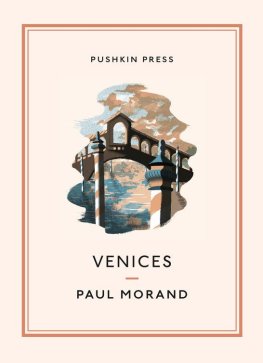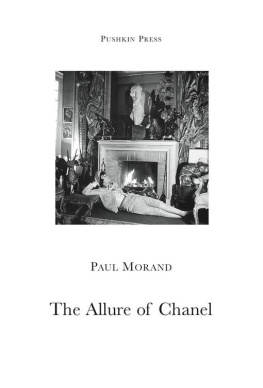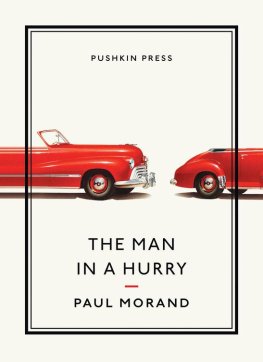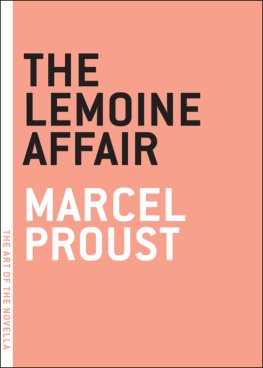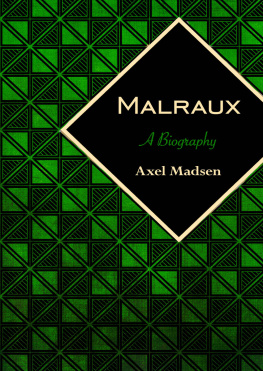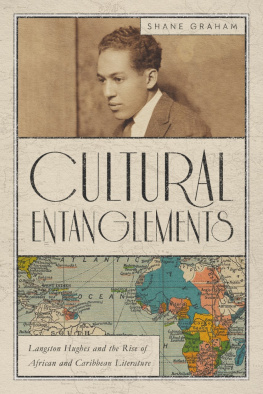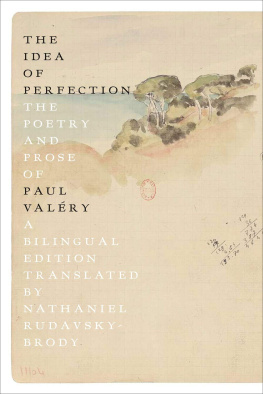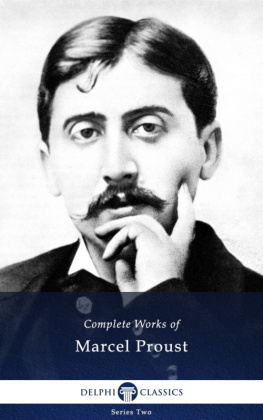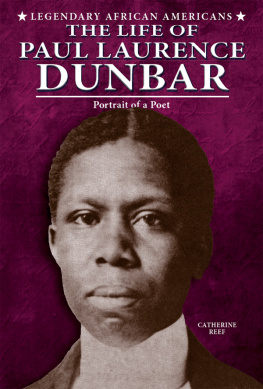Comtesse Greffulhe
Marcel Proust in Venice
Thophile Gautier photographed by Paul Nadar
Gabriele DAnnunzio at the regatta on Lake Garda, 1930
Henri de Rgnier
Jean Cocteau, 1934
The Groupe des Six (from left to right): Franois Poulenc, Germaine Tailleferre, Louis Durey, Jean Cocteau, Darius Milhaud, Arthur Honegger and a drawing of Georges Auric by Cocteau, 1931
Serge Lifar at the exhibition celebrating twenty years of the Ballets Russes at the Pavillon de Marsan, 1939
Serge Diaghilevs tomb on the island of San Michele, Venice
Max Jacob
The Grand Canal, Trieste
Self-portrait of Cecil Beaton at the Marco Polo Ball, Venice 1951
I THE PALACE OF THE ANCIENTS
ALL OF OUR LIVES are letters posted anonymously; my own bears three postmarks: Paris, London and Venice; fate, often unwittingly, though certainly not thoughtlessly, has decreed that I should have settled in these places.
Within her restricted space, Venice, situated as she is in the middle of nowhere, between the foetal waters and those of the Styx, encapsulates my journey on earth.
I sense a disillusion with the entire planet, apart from Venice, apart from the Basilica of St Marks, whose blistered, declivitous paving looks like prayer mats set side by side; the fact that I have known St Marks all my life thanks to a watercolour that used to hang in my bedroom as a child: it was a large wash-drawing painted by my father in about 1880bistre and sepia, and sketched in Chinese ink a piece of late romanticism, in which the red of the altar lamps pierces through the domes of golden dusk, and in which a turbanned throne is illuminated in the Western light. I also possess a little oil painting that belonged to my father, a view of the Salute on a grey day, which is of unusual delicacy and which has always been with me.
One must see Venice after it has been raining, Whistler used to say: it is after experiencing life that I have returned here to think about myself. Like the tarred spars that stake out her lagoon, Venice has delineated my life; yet she is merely one among other points of perspective; Venice has not been my entire life, but she constitutes a few fragments of it that are otherwise disconnected; her tide marks fade away; mine do not.
I remain impervious to the absurdity of writing about Venice, at a time when even the primacy of London and Paris is no more than a memory, at a time when the nerve centres of the world are remote spots such as Djakarta, Saigon, Katanga and Quemoy, where Europe can no longer make her authority felt, and where only Asia matters. Situated at the gates of that continent, Venice had understood this, and had penetrated as far as China; it is to Marco Polo that St Marks should be dedicated, not the other way round.
In Venice, my insignificant being had its first lesson on this planet, as I emerged from classrooms in which nothing had been learnt. School for me was nothing but endless boredom, exacerbated by justified reprimands; if there was still ink on my fingers, nothing remained in my head, and the weight of those books! Lugging the Quicherat dictionary from the Champs-lysees to the Lyce Monceau, along a route which those who have not climbed the rue de Courcelles each morning reckon to be flat crushed my narrow city-dwellers shoulders. The tarmac was hard beneath my feet; I was already thinking of Venice, and I was determined to celebrate that aquatic city, in which every street was the Seine.
The classic authors did not appeal to me; they had written for the courtiers of Versailles, or for teachers; nothing about our great writers intrigued, gripped or shocked me; what connection was there between the Atreids with their golden masks, which Schliemann had just excavated, and the bewigged Atreids of the seventeenth century? Starting ones life with Brnice! Appreciating Brnice at the age of thirteen! First I would have had to have fallen in love with someone who loved Racine; who could explain Racine to me, explain this heart of a woman grafted on to a mans body? No one provided me with a key to words, every other one of which meant something different to what it does today; I went from one misinterpretation to another: la gloire? reasons of State? A king who cried? Nuances are not childrens toys. How could a woman be both gentle and violent? On the other hand, I became thoroughly involved in Shakespeare, with his crimes and his ghosts, as I listened to Marcel Schwob and my father, who were translating Hamlet together for Sarah Bernhardt an infinitely more appetising translation than Gides searching among the English for some old French word, rather as one might discover a primitive painting beneath a later work. Shakespeare, that towering puppet-master, in whose plays everything, instead of being sliced into four parts, was reconciled and overcome.
I have never learnt grammar;1 its nothing to be proud of, but it seems to me that if I were to learn it today, I should no longer be able to write; my eye and my ear were my only teachers, the eye especially. Good writing is the opposite of writing well. There are not enough words to express what I think: thats because instead of thinking, you were searching for words; its up to the words to search for you, up to them to find you. You should be able to say of any one of your sentences: its the spitting image of its father. A writer should have his own wavelength.
The philosophy classes of my youth were merely the annexe of some miserable psychiatric hospital; geography merely provided me with a catalogue of gulfs and islands, an inventory of mountain tops and rivers, a repertory of peaks as bare as the mountains of the Moon; apparently no human being had ever lived there; as for History, its artificial discontinuities, its famous turning-points and the arbitrary divisions of its reigns precluded me from appreciating anything apart from battles, or treaties that were destined to pave the way for further battles.
As I look back with hindsight over the long years, what astonishes me are the curious omissions and the possibly tendentious silences of the early instruction I was given. I was taught nothing about pre-history, Byzantium, China and the Far East, the United States or Russia, about religions or music; I left my lyce knowing neither the names nor the voyages of the famous explorers, being totally ignorant about economic geography, the history of art, biochemistry and astronomy; not having read Montaigne, Hugo or Baudelaire, or the poets of Louis XIIVs reign, not Dante, Shakespeare or the German Romantics Colonna dIstria, my philosophy teacher, who was fascinated by malfunctions of the will, devoted six out of nine months to this subject, before dashing off logic, morals, metaphysics and the history of philosophy in a few hours; at Sciences Po,2 mile Bourgeois made us spend two years dozing over the Kings dusty secret. Who was responsible for these Ubuesque gaps which life had been unable to fill, for this inadequate instruction, wedged in between primary school certificate and the final degree, for this pit-ridden educational landscape through which I stumbled: the syllabus, the teachers, or my lapses of application and intelligence?
I hungered for nothing.
It may seem scarcely credible that I should speak of being uncivilised and narrow-minded. On top of my instinctive pessimism, education came and added the books that I was surrounded with, those from the family library: the Renan of the post-1870 years, Schopenhauer, Zola, Maupassant, Huysmans, the grinding of their teeth, their grim laughter.
I was an only son, a solitary child, and the first adages my father taught me were the following, so typical of Mrime: Remember to mistrust yourself

